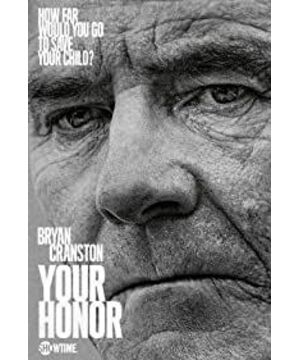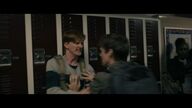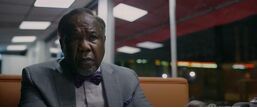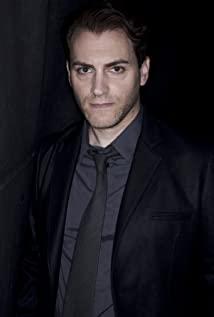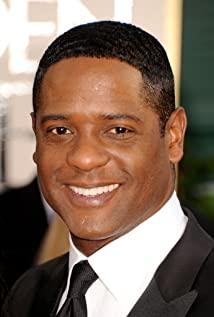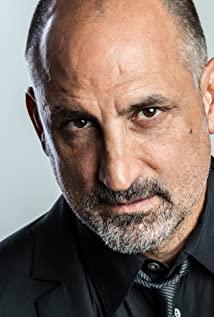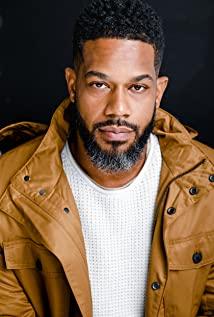Adam is the opposite and opposite of the judge. If what the judge did was to obliterate and tamper with, what Adam did was to record and restore.
In the dim and lonely old-school bar, the judge boringly turned the glass, taking a sip from time to time, emotionally immersed in the song "Treaty (contract)" by Leonard Cohen.
At the same time, Kofi was sent into the cell by a giant prison guard, and Adam set up the camera with a firm expression on his face.
Different from the panic before, Adam seemed to have a sense of mission and started a series of shooting actions, shooting the shoes he wore when the accident happened, and the scars on his body when the accident happened.
Kofi climbed to the bunk in the cell alone, there was no light in front of him, only curled up to sleep.
Adam, a firm conviction, and Kofi, a confused future, everyone faces the future with their own emotions, and the judge gives us the feeling that a man is deeply tortured by his own sins, and even confessed himself. But when reality is contrary to one's own destiny, how to choose is not up to you, just like the intriguing lyrics:
"I'm so sorry for that ghost I made you be."
"The poison enters into everything."
The lyrics and voice are obvious and obscure, original sin and confession, anger and exhaustion. The judge used Dylan Thomas' verse "raging against the dying of the light" to evaluate Cohen's later work.
But the judge once again deconstructed the audience's sympathy. Of course, judges have self-trial, but what is important is not a person's reflection, but the result of reflection. It turned out that the judge didn't come here to confess and buy drunkenness. His goal was the dejected man he turned around to strike up a conversation with, that is, the owner of the gas station that Adam had visited on the day of the accident.
The judge had already investigated the background of the gas station owner, only to know that he was divorced and that he would come to this bar after get off work.
Adam even went to the crime scene to photograph the remains after the accident. What he is doing is not just shooting evidence, he is recording the truth. This is why Adam is set to be a loyal photography fan. This is why Adam has a mother who is also good at photography. This is why it is necessary for Adam and his photography teacher to develop intimacy that is more than just a lover. relation. To sum it up in the simplest sentence: Adam is the opposite and opposite of the judge. If what the judge does is obliterate and tamper with, what Adam does is to record and restore. Such a proposition produces more associations than the story in the play. I think to some extent what humans are doing is nothing more than the two things done by the judge and Adam, or two sides of the same thing. But my feeling is that obliteration and tampering always have the upper hand, and recording and restoration are difficult to offset. What appeared in the dark was the car that drove Adam in the first episode of the black community.
The judge squeezed the divorced experience of the gas station owner, fabricated a similar experience of wife cheating for himself, and immediately received sympathy from the other party. Sorry, I was wrong. In this lie, he not only squeezed the gas station boss, but also exploited his dead wife, once again.
The judge succeeded in defrauding the boss's trust and took him to the gas station to watch the surveillance. In the next performance, the exaggerated body and unnatural expressions are very straightforward funny and ironic. The boss rubbed the judge's shoulders, casually found some words to comfort him, somehow he said: "You are fucking honorable man." The same blunt irony, just like the screenwriter beating the judge with a whip, the author has all intentions It is too obvious, this may be a feature of this drama that will incur disgust. Although the protagonist's acting skills are very good, like turning on and off a tap, but the similar plots inevitably make people feel a little deliberate and a little more dramatic. But we can also think about it from another angle. Maybe we over-expected it as a realist subject. In fact, it has a strong color of comedy and satire.
As soon as the boss left, the judge's tears seemed to have evaporated artificially, and he quickly carried out his wretched actions. He photographed the license plate of the witness at the gas station, which was a foreshadowing. When he asked and learned that this video was archived, the other party's voice did not stop, and he had coldly pressed the delete button.
Adam came to this prison where he was supposed to be serving his sentence and took photos. When the guards questioned him, he had to move out his father's name, which must have made him very frustrated. Because it was like he had always lacked the courage to tell the truth, so he could only obey his father's plan, but his father's shadow protection also shielded him.
Lawyer Li and Kofi met. Kofi's eye rubbing action let Li know that he had been lynched by the police, and Li suspected that he was a substitute for the crime. Latin elements appeared in the dialogue (Coffey said that there is no free lunch in the world, even in Latin). This is an arrangement of words in a grassy gray line, because there is another person in the show who is familiar with some Latin. In the play, Latin is used as a court language, as a tool for prosecution, and as a weapon of racial discrimination. Kofi is familiar with Latin words because he has faced these in court since he was ten years old.
The godmother of the Baxter family puts on makeup, looks noble but sad, her destination is the prison where the eldest son is held. When the godmother’s luxury car was passing through the periphery of the prison, there was a very contrasting scene. The godmother and the car body occupies the main part. In the corner, a group of black prisoners carrying labor tools flashed past. It is two police officers riding horses. The godmother sat in the car, through the thick window, from behind the black lens, looking at the scene out of the window indifferently. After a while, the window closed. Inside and outside the car window, there is no more obvious metaphor for isolation. The godmother treats her son so lovingly, but disdains other people's encounters.
The sense of responsibility is inefficient. The judges often have a backlog of cases, and even lead to the release of the recidivist after the trial is overdue. But this is not his responsibility, because this is a systemic problem. In a phone call from his boss, he heard the surname of "Baxter" and, like a slammer, he sensed that a new crisis was approaching. Carlo Baxter is the eldest son visited by the godmother, and she is trying to get him to attend the funeral of her brother, on the surface. Carlo is a strong racist, and now he will be released on bail and walk into the sun. And one thing he knew was that a black man killed his brother.
Adam gets into the court where his father works, and there is an interesting bridge in the elevator. In a stable triangle position, the two suspects live on the first level of the foreground and the drama, and Adam live on the second level of the background and drama, and at the center of gravity and the base of the drama. Two light-hearted suspects, one on the left and the other on the right, shared their "not worth mentioning" illegal behaviors, and suddenly looked back at Adam together. "Murder," Adam said frankly. The two young brothers burst into laughter. Adam also laughed, and he finally said it, with a hint of release at the corner of his mouth, and then fell into frustration again, because he only dared to tell the truth in a joking conversation with two strangers.
In this chic passage, the small confined space is like a miniature theater, with symmetrical shots, and three-stage dialogue with distinct levels, creating a special sense of ritual and comedy. And the center of gravity is always on Adam, and all this is only for Adam's psychological service. The joyful atmosphere in the space and the dark side of his heart form an anxious tension.
As a lawyer at a large law firm, Lawyer Li directly approached the local prosecutor to discuss Kofi’s case, but the local prosecutor had simple interests — he could not offend the police, let alone the Baxter family—— Refuse to provide help. It is worth noting that the blacks appearing in the play are generally divided into two groups, one group is disadvantaged black people, and the other group is mainstream black people. Needless to say the former, while the latter-lawyer Lee is black, Congressman Charlie is black, the president of the court is black, and the local attorney is black. None of this has changed the status quo of institutional racial injustice, and there is no overall situation for local blacks. Improvement has a visible positive impact. Even, besides Lee, the above-mentioned other black elites have raised such doubts that not only did they fail to make a positive contribution, they also allowed, contributed to, and even took advantage of this status quo. The simplest example, where did Charlie's votes come from?
The mother of the Baxter family went on a trip, both in light and dark, urging the lawyers to defend, and bribing the officials involved. The system and procedures are like shallow water in front of her, which can be passed in a flat trip. Seeing that she seemed fragile and pitiful in the warden, in fact she made the warden dumb to eat huanglian, not only a word could not resist, this hot money is also impossible if you don't want it or not. In the face of a seemingly perfect democratic mechanism, a criminal family is so aggressive, coming and going like the wind in a hugely operating big city.
Congressman Charlie's ally in the police station, Deputy Chief Rooney, found Xiao Mo because he learned that lawyer Li was looking for a prosecutor. One thing that is very shocking in the play is the speed of information transmission. From this point, we can see the festering drama inside this system.
Rooney did the dark job for Charlie, and Charlie himself stood in the sun, surrounded by his black supporters, playing his political identity. Rooney and Charlie's two plots are twisted together, which is an inconceivable irony.
In front of the supporters, Charlie was funny and responsible, but in a blink of an eye, Charlie and the judge walked into the dark room, angrily distorted his face, he accused the judge of getting him into trouble and threatening his political life. If you sympathize with him a little bit and accuse the judge with him, you will be fooled. The reason why Charlie had this easy illegal act was that he had already committed many illegal acts before. He had already become a two-faced person. The reason why he did not hesitate to help the judge was of course not only because of his friendship. Among them are important political considerations-win over judges and use the judge's moral reputation to endorse his running for mayor.
The essence of the matter is this: Before the judge became a double-faced person, I don’t know how many people in the play have become a senior double-faced person. It was the judge’s misstep that connected a huge dark map of the city drawn by these senior double-faced people, breaking through. The hollow and collapse of the entire system.
But the political value of judges is great, and Charlie will not easily give up this political capital. However, if he knew that the judge's son had killed the Baxter's youngest son, he would not think so.
The judge found Adam’s photography teacher, which is also part of his crisis prevention and control. He has long known the relationship between Adam and the teacher, but he has been quiet. You can say that this is a good understanding father, but such a deep city. It's really scary. Since the photography teacher was the safe haven that Adam sought after his mother's death, the judge would not have thought that Adam might confide to her his concerns-including the car accident. What made the teacher nervous was naturally that she thought the judge had seen through the teacher-student relationship between her and Adam, and came to ask the teacher for guilt. In the end, the judge asked the answer. The photography teacher didn’t know Adam’s secrets. If she knew, she wouldn’t ask what happened to Adam’s injuries. Intimacy). But the judge could not think of the subsequent changes.
Adam’s dance in the darkroom is a passage that I like very much. The black butterfly suffocated on the chest of a teenager moves and releases secretly in an unknown space. Such a plot is an emotional variation and gushing at the right time for the overall gloomy drama.
When Adam was cleaning the film, he stared at one of the negatives for a long while, seeing that it was the shape of the Baxter family's second son when he was dying. At that time, Adam was just like this, looking at the passing lives, but he was in the game at that time, the six gods had no master, but now it is the memory and reappearance afterwards, the quiet pain and the indifference of knowing that it is irretrievable but trying his best to try to save something.
During their date, the judge guided Li not to dig into the truth, but to seize practical conditions and pursue as many reductions as possible for Kofi. Li thought the judge was training her in thinking as before. The judge asked Li about the next countermeasures. Li's answer might make him feel a bit out of control, because Li did not intend to reduce his sentence only, but to use media methods to force the local prosecutor to withdraw the charges. It is undoubtedly derail for judges to make things bigger, create social influence, and attract countless eyes of attention.
The moment the judge walked into the house and found that Officer Nancy was collecting Adam’s fingerprints, it must have been the most horrifying moment in this episode. The judge’s face had an expression that everything was finished, and it was this step. How far can it be? Adam is usually right-handed. He made phone calls at the scene of the accident, holding the inhaler, using his right hand. When the judge walked in, Nancy was holding Adam's right finger and punching the mold one by one.
Nancy collected the testimony of the father and son. The background music was mysterious, and the father and son were weaving lies without telling them. Nancy present here did not know, but they always put pressure on their hearts. When listening to Adam Yuan's lie, the judge wore a stiff, sensitive smile on his face, always worried about things being revealed, he almost held his breath, but pretended to be relaxed. But Adam came back with this lie, and the judge felt somewhat relieved. When Nancy took out the pair of handcuffs, what you can appreciate is the skill of the film scheduler, because your emotions are always firmly controlled.
The plot ends with the judge’s Latin "mea culpa (my fault)" and a close-up of the dark encounter between the father and the son. The father's face is swallowed up by darkness, and Adam's face is half-hidden. Who is right and who is wrong, the answer will only become more vague. And this Latin line also resonated formally with Kofi's Latin motto when he met Lee. Latin has become a judgment, Latin has become a tool of racial discrimination, and Latin has become a whip to torture the soul.
For the godfather of Baxter's family, the cause of his son's death is still not clear enough, and the revenge behavior of the Yulian Gang cannot fully convince him. But his white paper fan believes that the reason is not important, but it must be countered. The godmother even advocates exchange of blood for blood, which is a general ledger (we go big once).
The judge tried to have a relaxed chat with Adam, but all the good old days are irretrievable. The judge just wanted to get everything back on track, but Adam couldn't accept the illusion that nothing happened. Tomorrow will still be one of thousands of Saturdays, but tomorrow will be the day when a young man related to them will be buried.
But the next day, the judge appeared in the cemetery where the young man was buried, watching the process of the burial ceremony, and shed tears of guilt. But the emotion is still short-lived. You don't know whether you should say that the split of human nature was too rapid, or whether you should blame the change for happening too quickly. The eldest son of the Baxter family godfather was imprisoned by the Louisiana Department of Corrections to attend the funeral, but was taken over by the prisoner by the New Orleans police in a blink of an eye. This means that the eldest son of the Baxter family will become inmates with Kofi, the second son of the "killing" family. The judge was so quick and wise, he realized this level all at once, and he wanted to prevent this from happening. What he wanted to prevent from happening was the task given by the godmother to the eldest son—killing Kofi and avenging his younger brother. Finally, the direction that the godmother's eldest son stared at was his younger brother's grave.
Li is an outsider in this city. She is very smart, but she can't touch the dark heart of this city like a judge. The local prosecutor promised her to cancel the charges against Kofi and release Kofi acquitted tomorrow morning. The local attorney suddenly agreed to be so simple and to give back so much, it was very abrupt, as abrupt as he knew Kofi would not survive tomorrow morning. The judge is also aware of this. Although he has asked the sheriff to provide Kofi with protective imprisonment, he does not have much confidence in the effect of this measure. He does not know the influence of the Baxter family on the New Orleans Police Department. But for him, he has tried his best, right? He can convince himself of peace of mind. What he had to do right now was to fix the woman in front of him, as the congressman said. And the best way to get a woman is to get her, which also comes from the "teaching" of a congressman.
The final montage of this episode is intertwined with the two teenagers losing control of their own destiny.
Adam brought the photos he took to the teacher's house, and confided the truth and self-blame in his blocked heart. Sincerity is what he wants to pursue. At least for now, he has made a breakthrough and has been sincere to a person (although this makes his teacher a legal insider).
The sudden medical examination was a conspiracy, and Kofi's life was at stake. The white policeman who brought Kofi to the infirmary and the black policeman who appeared in time to relieve the siege should have been informed. Behind them are the Baxter family and the gang of desires. Kofi took the blame for Yuxian's help, Yuxian promised to keep him safe, but they decided to abandon him. On the surface, it seems to be the logic of the black prison head. The Baxter family can't afford it. This is part of the reason, but there is another important reason. I don't want to stay with Kofi anymore. Because Kofi is alive, who can guarantee that a lawyer like Li will not discover what is behind the scenes through him, and once faced with this situation, how can a politician like Charlie rest assured to sleep? Kofi took the initiative to die, and Kofi was persuaded to jump into the well. Kofi was sacrificed.
A greater tragedy has occurred. A teenager died in an unfortunate accident. This is a daily tragedy. Another young man was dying because of an innocent involvement. This was a man-made evil. Will there be the next teenager killed?
Public number: Duan Xuesheng
View more about Your Honor reviews


